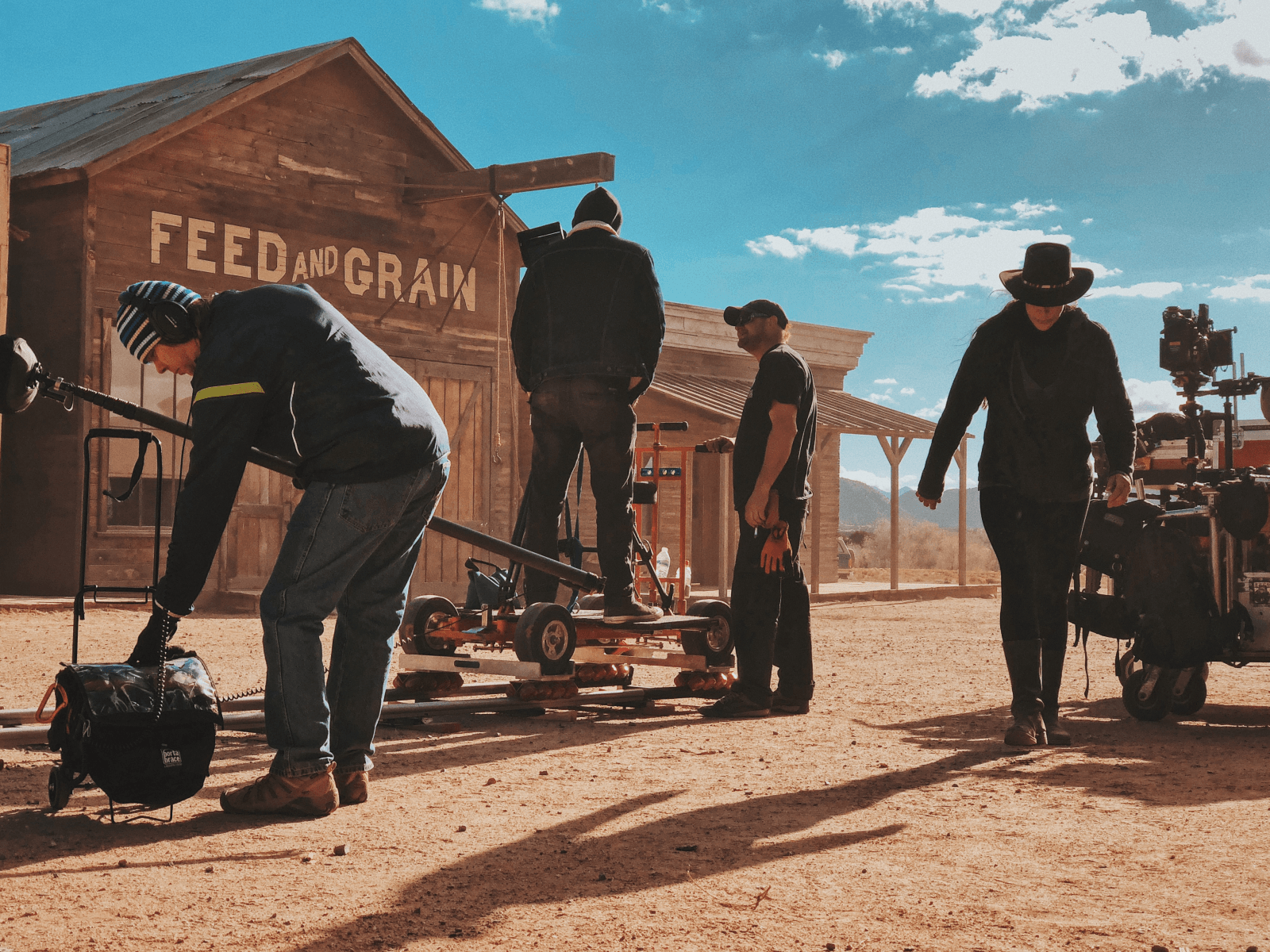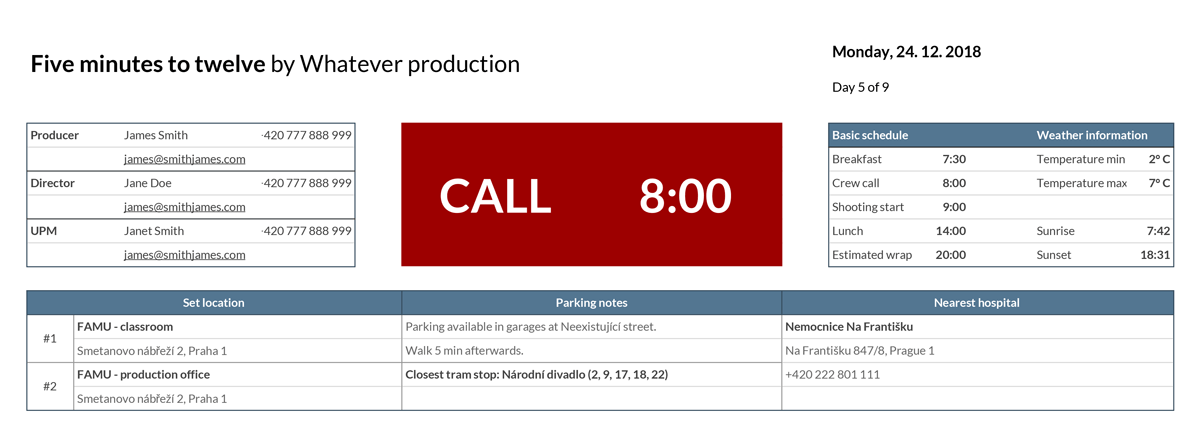September is an amazing month for all first-year students. They come to their new schools, make new friendships, they start writing a new chapter in their life. This year I had the chance to witness that. And in our school (or any school that teaches team-oriented profession) - Film and Television Faculty of Performing Arts in Prague - making friends is extremely important because these students are looking at people who will help them make their films come true during next months, even years if they came to get their Masters degree.
This fall semester I saw how our students made their projects (with bigger or smaller troubles of different kinds along the way), I decided that it might be helpful to give them some guidelines on how to set up their collaboration for success, as much as they can.
Sure, in filmmaking there is always risk and shitload of unknowns coming in play, but the most important thing is the crew. And within the crew, there are few key figures that make or break the whole project - yeah, I am talking about the heads of departments.
Disclaimer:
Whatever I write next is taken from the experience of mine and my friends or students, it is a subjective view and you may not agree with me. That is up to your own decision. And even though this is taken from filmmaking environment, you can implement these key ideas into any type of collaboration you think of.
Set realistic expectations
This needs to be addressed any time there is something new on the agenda (meaning it can be several times during a project). Like change of location, costumes, script, not to mention budget. Also - this particular issue can take several meetings (or e-mails, phone calls) to resolve. And that's okay, it doesn't have to be defined during the first sit-down.
Video production client example
I've been on many meetings with clients and talked to countless people about videos they would like to have. I fucked-up some of the contracts. And most of those fuck-ups happened exactly because I did not set realistic expectations. A client showed me a video with budget 10x times bigger than what he has and I never said I can't deliver. I haven't shown him a video of the same type, but similar to the budget he had. And when we delivered the first draft of video, it was on a different level than what he imagined. There you go - I have not set realistic expectations in the beginning.
Sure, we finished the job, delivered a good looking video, but not the one client thought he’ll have. No need to mention we never worked together again. But as soon as I started to set these expectations right away, the narrative changed. I clearly stated things that were out of the question because of the budget or told them how much more it might cost them, or what they can do instead with the budget they have. And even when we didn't get the job, clients were thankful, because at least somebody showed them what can be done for what kind of budget.
Film production example
On a student (or low-to-mid-budget) set you might get into expectations of what exactly will be whose responsibilities, who takes care of what and for example what kind of locations can you expect to get in the price you have (and if you get anything better than expected - great, you made everyone happy!). Or how much time you can set aside on the project because you still have bills to pay, when are you not available. Define the expectations, make them concrete, not abstract.
Define rules and set deadlines
The second premise to successful collab is to define rules and set deadlines. Remember - what isn't forbidden is allowed. So if you from experience know about something you don't want to have in your project, it needs to be said.
Video production client example
Clients sometimes have an idea that they can have 9 revisions of edit, and during 8th they finally say “Oh yeah, and we don’t like the music, can you change it?" Imagine if you edit to the music (like an event video), and now they want something that changes the dynamics, the whole feeling. Bummer, right?
So set a rule before - clients have 3 revisions total and can change the music only in the first revision. If he does it later, the re-edit has to be paid extra. Also, clients have to send all the graphics they want in the video, and if they want you to produce the graphics, it costs this and that. Otherwise, they will expect you to make it, as it is a part of the video. And you may have thought they will deliver it. See? Expectations.
Film production example
Again, on student film set you may define when the script will be locked and not tampered in any significant way, when the equipment list has to be locked (because you pay cancellation fees to rentals), what are the rules on locations (no smoking, can't do overtime because owners have already other plans), who pays what if you go over budget. And so on.
As far as deadlines go - there isn't much to be explained. Set those deadlines - for yourself and for your people (or clients) as well and be strict about them (but also be human - if somebody comes in advance and starts addressing the deadline as something they can't make on time, it's okay to postpone if possible).
Also, explain that if anybody won't honour the deadlines, the whole project won't be finished in time. And write these conditions and rules and deadlines into e-mail, and send that e-mail to everyone relevant.
Keep yourself responsible and accountable
If you want to have success in the end, someone has to stand up for all that you agreed upon. And because you are reading this article, that someone will be you. You just can't hold responsible and accountable others - you have no control over their actions. But as long as you hold yourself at the highest standard, you keep yourself responsible and accountable, your slate will be clean. Because if you yourself won't honour the deals you made, how the fuck can you expect others to?
BONUS Principle: Respect
This one is both work & life principle and it was brought to my attention by a friend of mine (thanks Hanuš!) after he read the first draft of this article.
It's important to treat others with respect. Filmmaking is a team effort, and if your crew is not working together, and not respecting each other within, it's going to demonstrate at some point, somewhere. So be respectful to others, to their positions, responsibilities and ideas. Because don't forget that the runner you've been an ass to yesterday might be a producer in a year, deciding whether to hire you or not. And I am not even mentioning to respect all people involved with the film but not in the core crew - location owners, rental people, agents, accountants and so on.
Sometimes you may get into a situation where you'll say: "But they behaved like assholes to me, why the hell should I respect them?" And my answer to that is: "Because it says more about you than them. You show respect, you act with respect, you are the bigger man (woman, person). And it is a declaration of your values and attitude." That doesn't mean you should let yourself be humiliated or made an ass of. However, you can tell them to go fuck themselves in a polite, even respectful way.
So there you have it - four key principles that will make your life easier, your projects smoother and hopefully - successful.









